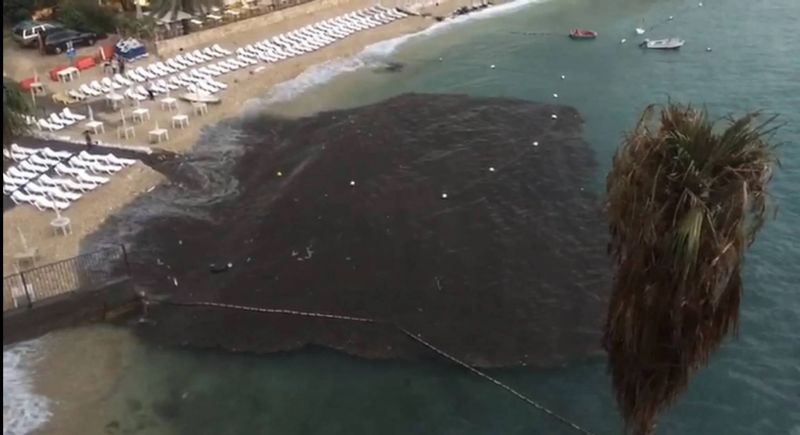
Black liquid spilling into Tabarja Bay, Keserwan, August 28, 2023. (Credit: Photo sent to L'Orient-Le Jour by a witness)
BEIRUT — Late on Monday, sewage spilled onto the Tabarja coastline in the Keserwan district. The spill caused the bay to turn black, witnesses told L'Orient-Le Jour.
Samir Yazbek, head of the Civil Defense rescue units, confirmed the spill to L'Orient Today on Tuesday, explaining that "firefighters and police went to the scene on Tuesday morning to see the damage, but nothing was visible anymore."
The incident occurred after heavy rains hit the whole country late Monday afternoon. According to Yazbek, a sewage system was clogged with solid waste, which eventually overflowed during the rains. The sewer system is managed by the municipality of Tabarja.
Hala*, a French-Lebanese woman who was staying at the seaside resort of Saint-Paul with her son, filmed the scene from her terrace.
"What an ecological disaster! They've poured all the sewage into the sea!" she can be heard exclaiming in a video sent to L'Orient-Le Jour. She told L'Orient-Le Jour she did not know who might be responsible for the spill.
"In less than 20 minutes, the entire sea turned black! Look at the photos and compare the size of the stain to the size of the boats and you can see the extent of the damage," Hala said.
"I tried to contact a firefighter, who in turn called his superiors to no avail. I called the police at 112 but was given a five-digit telephone number," Hala continued. "I tried to reach the president of the Tabarja municipal council by phone and by message. I even sent two e-mails to NGOs specializing in the environment, but got no response."
'Not the first time'
L'Orient Le-Jour contacted the Saint-Paul administration, which refused to comment on the matter. Nabil Naccouzi, president of the Tabarja municipal council, was not immediately available for comment.
"This is not the first time such an incident has happened. The sewers have overflowed in the past, following heavy rains," explained Yazbek. "When the emergency services went to the scene on Tuesday morning, they found no [visible trace of sewage] in the sea".
However, our L'Orient Today received images from Hala on Tuesday morning showing traces of pollution still present.
On Tuesday, caretaker Minister of Transport, Ali Hamiyeh, shared images on "X" (formerly known as Twitter) highlighting rainwater drainage pipes clogged with waste, notably near Beirut International Airport.
"Can we really imagine drains being turned into dumping grounds for garbage?" he wrote. "It is incumbent on all citizens and parties concerned, without exception, to show responsibility ... in order to avoid unwanted repercussions from the imminent onset of the rainy season," he added.
'More plastic than fish'
"In Lebanon, more than 90 percent of water treatment plants are out of service. Of the 67 existing plants, 62 are at a standstill," Paul Abi Rached, president of Lebanon Eco Movement and Terre Liban, told L'Orient-Le Jour.
"The real danger lies mainly in the accumulation of microplastics in the Mediterranean, including cigarette butts, plastic bags and other waste. Studies have shown that if the situation continues, in a few years there will be more plastic than fish in the Mediterranean Sea," he warned.
*The name has been changed at the request of the witness.